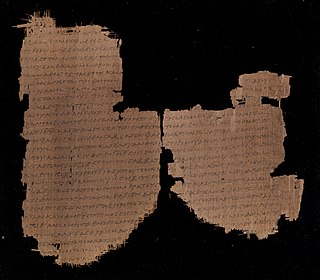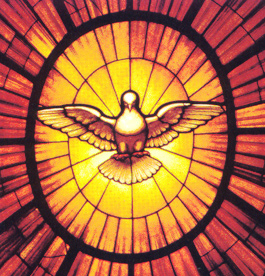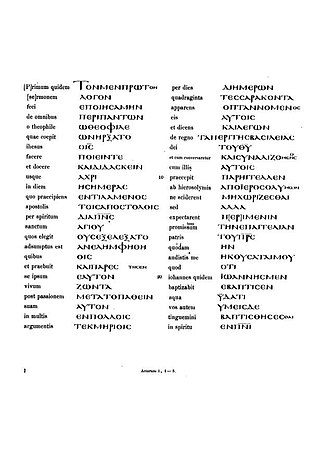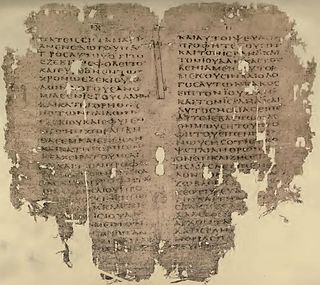
The Acts of the Apostles is the fifth book of the New Testament; it tells of the founding of the Christian Church and the spread of its message to the Roman Empire.

Baptism is a Christian sacrament of initiation almost invariably with the use of water. It may be performed by sprinkling or pouring water on the head, or by immersing in water either partially or completely, traditionally three times, once for each person of the Trinity. The synoptic gospels recount that John the Baptist baptised Jesus. Baptism is considered a sacrament in most churches, and as an ordinance in others. Baptism according to the Trinitarian formula, which is done in most mainstream Christian denominations, is seen as being a basis for Christian ecumenism, the concept of unity amongst Christians. Baptism is also called christening, although some reserve the word "christening" for the baptism of infants. In certain Christian denominations, such as the Catholic Churches, Eastern Orthodox Churches, Oriental Orthodox Churches, Assyrian Church of the East, and Lutheran Churches, baptism is the door to church membership, with candidates taking baptismal vows. It has also given its name to the Baptist churches and denominations.

The Gospel of Mark is the second of the four canonical Gospels and one of the three synoptic Gospels. It tells of the ministry of Jesus from his baptism by John the Baptist to his death, the burial of his body, and the discovery of his empty tomb. It portrays Jesus as a teacher, an exorcist, a healer, and a miracle worker, though it does not mention a miraculous birth or divine pre-existence. Jesus refers to himself as the Son of Man. He is called the Son of God but keeps his messianic nature secret; even his disciples fail to understand him. All this is in keeping with the Christian interpretation of prophecy, which is believed to foretell the fate of the messiah as suffering servant.

The Gospel of Luke is the third of the New Testament's four canonical Gospels. It tells of the origins, birth, ministry, death, resurrection, and ascension of Jesus. Together with the Acts of the Apostles, it makes up a two-volume work which scholars call Luke–Acts, accounting for 27.5% of the New Testament. The combined work divides the history of first-century Christianity into three stages, with the gospel making up the first two of these – the life of Jesus the messiah (Christ) from his birth to the beginning of his mission in the meeting with John the Baptist, followed by his ministry with events such as the Sermon on the Plain and its Beatitudes, and his Passion, death, and resurrection.

The Gospel of Matthew is the first book of the New Testament of the Bible and one of the three synoptic Gospels. It tells how Israel's messiah (Christ), Jesus, comes to his people but is rejected by them and how, after his resurrection, he sends the disciples to the gentiles instead. Matthew wishes to emphasize that the Jewish tradition should not be lost in a church that was increasingly becoming gentile. The gospel reflects the struggles and conflicts between the evangelist's community and the other Jews, particularly with its sharp criticism of the scribes and Pharisees with the position that through their rejection of Christ, the Kingdom of Heaven has been taken away from them and given instead to the church.
In Judaism, the Holy Spirit, otherwise known as the Holy Ghost, is the divine force, quality and influence of God over the universe or his creatures. In Nicene Christianity, the Holy Spirit is the third person of the Trinity. In Islam, the Holy Spirit acts as an agent of divine action or communication. In the Baha’i Faith, the Holy Spirit is seen as the intermediary between God and man and "the outpouring grace of God and the effulgent rays that emanate from His Manifestation".
The New Testament (NT) is the second division of the Christian biblical canon. It discusses the teachings and person of Jesus, as well as events relating to first-century Christianity. The New Testament's background, the first division of the Christian Bible, is called the Old Testament, which is based primarily upon the Hebrew Bible; together they are regarded as Sacred Scripture by Christians.
In Christian theology, baptism with the Holy Spirit, also called baptism in the Holy Spirit or baptism in the Holy Ghost, has been interpreted by different Christian denominations and traditions in a variety of ways due to differences in the doctrines of salvation and ecclesiology. It is frequently associated with incorporation into the Christian Church, the bestowal of spiritual gifts, and empowerment for Christian ministry. Spirit baptism has been variously defined as part of the sacraments of initiation into the church, as being synonymous with regeneration, or as being synonymous with Christian perfection. The term baptism with the Holy Spirit originates in the New Testament, and all Christian traditions accept it as a theological concept.

Two names and a variety of titles are used to refer to Jesus in the New Testament. In Christianity, the two names Jesus and Emmanuel that refer to Jesus in the New Testament have salvific attributes. After the crucifixion of Jesus the early Church did not simply repeat his messages, but focused on him, proclaimed him, and tried to understand and explain his message. One element of the process of understanding and proclaiming Jesus was the attribution of titles to him. Some of the titles that were gradually used in the early Church and then appeared in the New Testament were adopted from the Jewish context of the age, while others were selected to refer to, and underscore the message, mission and teachings of Jesus. In time, some of these titles gathered significant Christological significance.

The baptism of Jesus, the ritual purification of Jesus with water by John the Baptist, was a major event described in the three synoptic Gospels of the New Testament. It is considered to have taken place at Al-Maghtas, today located in Jordan.
This is a glossary of terms used in Christianity.

The Ethiopian eunuch is a figure in the New Testament of the Bible. The story of his conversion to Christianity at the preaching of Philip the Evangelist is recounted in Acts 8.

Christianity in the 1st century covers the formative history of Christianity from the start of the ministry of Jesus to the death of the last of the Twelve Apostles and is thus also known as the Apostolic Age. Early Christianity developed out of the eschatological ministry of Jesus. Subsequent to Jesus' death, his earliest followers formed an apocalyptic messianic Jewish sect during the late Second Temple period of the 1st century. Initially believing that Jesus' resurrection was the start of the end time, their beliefs soon changed in the expected Second Coming of Jesus and the start of God's Kingdom at a later point in time.

The following outline is provided as an overview of and topical guide to Christianity:

The Bible usually uses the name of God in the singular, generally using the terms in a very general sense rather than referring to any special designation of God. However, general references to the name of God may branch to other special forms which express His multifaceted attributes. The Old Testament/Hebrew Bible reveals YHWH as the personal name of God, along with certain titles including El Elyon and El Shaddai. Jah or Yah is an abbreviation of Jahweh/Yahweh, and often sees usage by Christians in the interjection "Hallelujah", meaning "Praise Yah", which is used to give God glory. In the New Testament the terms Theos, Kyrios and Patēr are additionally used to reference God.
The canon of the New Testament is the set of books many modern Christians regard as divinely inspired and constituting the New Testament of the Christian Bible. For most churches, the canon is an agreed-upon list of 27 books that includes the canonical Gospels, Acts, letters attributed to various apostles, and Revelation.

For the majority of Christian denominations, the Holy Spirit, or Holy Ghost, is believed to be the third divine person of the Trinity, a triune god manifested as God the Father, God the Son, and God the Holy Spirit, each being God. Nontrinitarian Christians, who reject the doctrine of the Trinity, differ significantly from mainstream Christianity in their beliefs about the Holy Spirit. In Christian theology, pneumatology is the study of the Holy Spirit. Due to Christianity's historical relationship with Judaism, theologians often identify the Holy Spirit with the concept of the Ruach Hakodesh in Jewish scripture, on the theory that Jesus was expanding upon these Jewish concepts. Similar names, and ideas, include the Ruach Elohim, Ruach YHWH, and the Ruach Hakodesh. In the New Testament the Holy Spirit is identified with the Spirit of Christ, the Spirit of Truth, and the Paraclete (helper).

In Christian theology and ecclesiology, the apostles, particularly the Twelve Apostles, were the primary disciples of Jesus according to the New Testament. During the life and ministry of Jesus in the 1st century AD, the apostles were his closest followers and became the primary teachers of the gospel message of Jesus. There is also an Eastern Christian tradition derived from the Gospel of Luke that there were seventy apostles during the time of Jesus' ministry.

Acts 1 is the first chapter of the Acts of the Apostles in the New Testament of the Christian Bible. The book containing this chapter is anonymous, but early Christian tradition affirmed that Luke composed this book as well as the Gospel of Luke. This chapter functions as a transition from the "former account" with a narrative prelude, repeated record of the ascension of Jesus Christ with more detail and the meeting of Jesus' followers, until before Pentecost.

Acts 2 is the second chapter of the Acts of the Apostles in the New Testament of the Christian Bible. The book containing this chapter is anonymous but early Christian tradition asserted that Luke composed this book as well as the Gospel of Luke. This chapter records the events on the day of Pentecost, about 10 days after the ascension of Jesus Christ.















